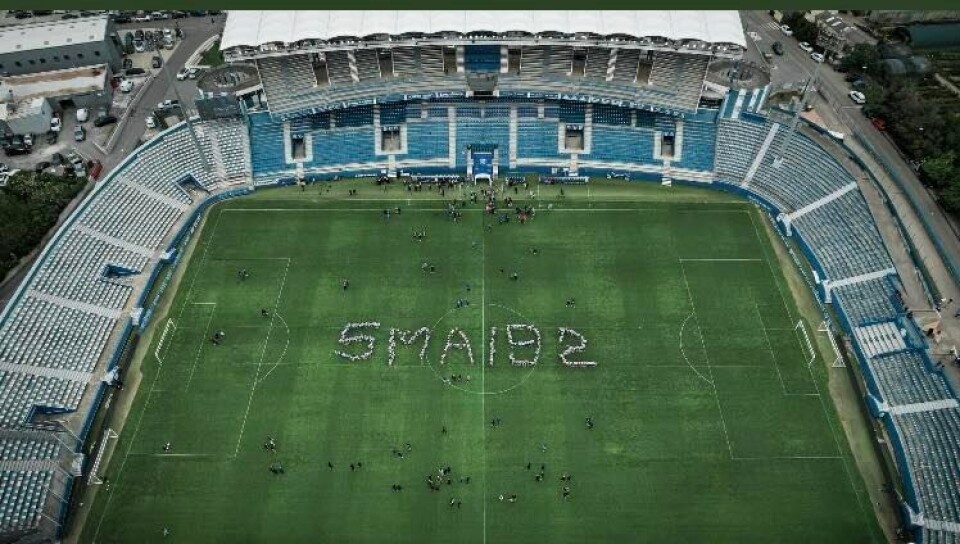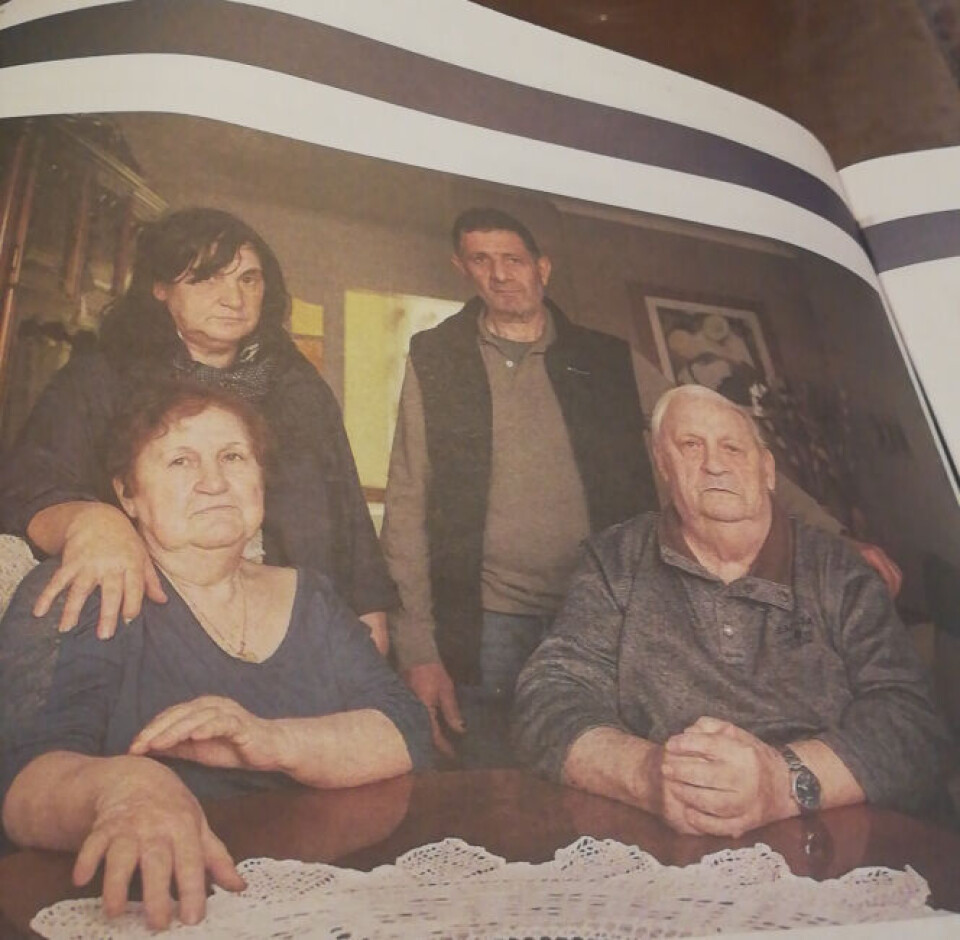-
Driving getting safer in France, suggest January 2025 road safety statistics
Fewer drivers, motorcyclists, and cyclists died last month - but more pedestrians lost their lives
-
Photo: mystery of upside-down camping car in ditch in Brittany
The vehicle was found in an almost vertical position with no one inside or at the scene
-
Know your cheeses and their seasons: which to eat in France in February
Cow’s milk cheeses dominate as winter comes to an end
30 years on: Remembering France’s Furiani football disaster
On May 5, 1992, a terrace at the Armand-Cesari Stadium in Corsica collapsed during a semi-final match, killing 19 people

The French football industry is today (May 5) remembering the 30th anniversary of the Furiani disaster, the most tragic event in French sporting history.
On May 5, 1992, 19 people were killed and more than 2,357 injured after one of the overcrowded terraces in Armand-Cesari Stadium – also known as the Furiani Stadium – in Bastia collapsed during the Coupe de France semi-final between the SC Bastia and the Olympique de Marseille (OM).
The event was widely covered by French news channels, the disaster having unfolded while the players were still warming up, and prompted then-president Francois Mitterrand to visit the victims in a hospital in Bastia (Corsica).
As a result, representatives of the terrace builders, SC Bastia football club, Bastia’s prefect and the French Football Federation (FFF) all faced criminal charges for allowing the terrace to be constructed just days before the event, and for disregarding safety guidelines.
The Furiani disaster happened at a time when the football industry was still reeling from similar catastrophes such as the Hillsborough disaster in 1989 and the Heysel stadium disaster in 1985.
One victim and the president of a remembrance association spoke to The Connexion on the significance of the tragedy and what they perceived to be France’s failure to duly commemorate it.
“It wasn’t the usual football celebration, it was a horror,” said Corinne Di Caro, 54, who was there on the day of the tragedy and whose younger sister lost her life.
Ms Di Caro, who was 25 years old at the time, was on the upper seats of the terrace when it collapsed, leaving her 23-year-old sister in a coma for 15 days before she died on May 20, 1992.
Ms Di Caro had booked four tickets with her sister and both of their husbands for seats originally located on a different terrace. When they arrived on the eastern terrace at the stadium, the Caro family was told to move to a northern terrace since the terrace they had booked was already too crowded.
‘Built on brick and pieces of wood’
The northern terrace had been built in a hurry following SC Bastia’s qualification for the semi-final, in an effort to extend the maximum capacity of the stadium to 18,000 seats.
The Claude Papi terrace was destroyed and replaced by a metallic structure hosting 9,300 seats.
Construction began on April 28, 1992 before a security commission came the day after to inspect the building and confirm that it followed safety guidelines. The commission expressed concerns about the structure, but the Corsican football league sent fake approval documents to the French Football Federation.
The structure was not ready the day prior to the game. Ms Di Caro said she refuses to call it a terrace, preferring the term “scaffolding.”
“It was built on bricks and pieces of dangling wood,” she said.
Ms Di Caro said she remembered the speakers in the stadium advising the crowd not to stamp their feet too heavily seven or eight times, adding she did not even think for a second it would collapse.
“Do you really think they would have displaced us if we had any chance of falling?” she said she remembered telling another worried spectator nearby.
Ms Di Caro remembers only short bursts of what happened next, but one clear memory is of her sister lying unresponsive on the ground before she tried to escape the heap of scrap metal surrounding her and the other victims.
“Time is no therapy. I feel guilty for not remembering all of what happened that day. Why her and not me? I still do not have an answer to that question,” said Ms Di Caro.

Ms Di Caro (top left) with her parents and husband.
Players from both teams refused to play following the collapse of the terrace and the Coupe de France was suspended for the first time in its history. The day after, socialist president François Mitterrand said “France stands in solidarity” with the victims when he visited them at Bastia’s hospital.
Eight individuals, including the directors of the construction companies, officials from the SC Bastia, the French professional football league and the FFF were sentenced to jail time and fines by the Bastia’s magistrate court on October 31, 1995, following years of court hearings.
MPs passed a law in October 2021 forbidding organisations from French football clubs to play any matches involving two French teams on May 5 in an effort to pay tribute to the victims of the tragedy.
‘None of the initial demands met’
Remembrance of the Furiani disaster is led by the ‘Collectif des victimes du 5 mai 92’, an association created the day after the disaster in an effort to demand compensation for victims of the Furiani disaster. Among the creators was Ms Di Caro’s father.
The association has planned to gather before the commemorative stone tablet at the entrance of the stadium today at 16:00 before going to the church at 18:00, as part of a series of events commemorating the disaster this week.
The commemorations started on April 22 with an art project from local school pupils, which was followed during the week by the screening of “5 Mai 92”, a 26-minute-long movie centred around the event, which will be also be screened at the 2022 Cannes Film Festival
Friendly football matches with past players from SC Bastia and Olympique de Marseille have also been planned.
President Emmanuel Macron today Tweeted a tribute to the victims of the disaster, writing: "30 years ago, while the Coupe de France semi-final was being played at Furiani, a platform collapsed. Corsica, Marseille, and with them, all of France were in mourning. [My] thoughts are with the victims, their families and everyone who was hurt."
However, the association still argues that the parties involved in the tragedy are failing to take responsibility, and criticises the “weak” penalties imposed by the courts.
“None of our initial demands were met,” said Josepha Giudicelli, president of the “collectif des victimes du 5 mai 92”, with reference to the lack of sanctions and compensation from the State.
Ms Giudicelli said the association was created to demand justice, “fair financial compensation”, the building of a rehabilitation centre for victims in Bastia and a “stadium worthy of the name.”
She accepted that victims received financial compensation but said the rehabilitation centre is too small and the stadium has been under repeated construction for thirty years, at a cost of €40 million so far.
Ms Giudicelli also condemned the fact that then-Sports Secretary Thierry Braillard only qualified the Furiani disaster as a “national tragedy” when visiting Corsica in 2016, after then-Prime Minister David Cameron acknowledged that Liverpool fans were utterly blameless for the Hillsborough disaster.
She said that she viewed this as a greater remembrance effort.
Read more: President Macron to honour last survivor of Oradour-sur-Glane massacre
While France has forbidden football matches between French clubs on May 5, the Olympique de Marseille football club will play tonight at the Orange Vélodrome Stadium, in Marseille.
Marseille faces Dutch club Feyenoord for the second game of the semi-final of the UEFA Europa Conference League, a football tournament between European football clubs, after having lost 3-2 during the first game.
Players will wear a black armband and observe a minute’s silence in remembrance of the tragedy.
This match does not fall under French law as it is regulated by a European organisation.
Ms Di Caro said that: “It still gives me a heavy heart,” to see one of the two clubs present on the day of the disaster playing.
Related articles
France hosts 2019 women’s World Cup
Brief history of Les Bleus is real coq and ball story
Paris terror attacks survivor: Remember the victims, not their killers
























